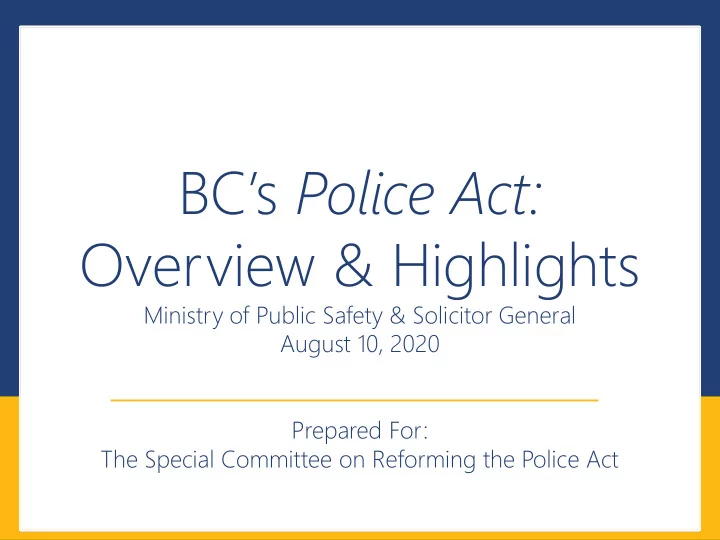

BC’s Police Act: Overview & Highlights Ministry of Public Safety & Solicitor General August 10, 2020 Prepared For: The Special Committee on Reforming the Police Act
Federal and Provincial Roles in Policing LEGEND Constitution Act [ss. 91 POGG & (27)] [ss. 92(14)] Governments Federal Provincial Legislation Government Government RCMP Act BC Police Act Policing Agreements Operational Policing Provincial Municipal Police Service Police Service Municipal Board Agreement Agreement Government Municipal Municipal Police Unit Police Board Agreements RCMP RCMP RCMP Independent Federal Provincial Municipal Municipal Police Police Police Police Service Service Services Departments 2
Police Act – Key Functions • The current Police Act was introduced in 1974 and regulates the delivery and organization of policing services. Minis nister er o of Publi lic S Safety & & Direc ector o of Polic ice e Ser ervic ices Solic licitor G Gen eneral Superintends policing and law enforcement in B.C. on behalf of the Minister Ensures adequate and effective level of policing and law enforcement Establishes provincial policing standards Inspects and reports on the quality and standard of policing Conducts studies on policing, law enforcement, and crime prevention Conducts inquiries on crime, investigations, and policing and law enforcement 3 2020-08-06
Governance • Agreements to use RCMP (Part 3, section 14) o The RCMP is BC’s provincial police force • Municipalities that use the RCMP as their municipal police service (section 3(1)(c)) • Independent Police Departments and Municipal Police Boards (Part 5) o Municipal police board (section 23) o Chair of municipal police board (section 25) o Board to establish municipal police department (section 26) o Estimates and expenditures (section 27) 4 2020-08-06
Independent Oversight Independent Investigations Office (Part 7.1) • o Applies to both RCMP and municipal police officers Office of the Police Complaint Commissioner (Part 9) • Misconduct, Complaints, Investigations, Discipline and • Proceedings (Part 11) o Applies to municipal police officers, not RCMP members Various regulations related to oversight • 5 2020-08-06
Structure & Service Delivery Minister’s overarching responsibility (section 2) • Responsibilities of Provincial and municipal governments for • providing policing and law enforcement services (section 3) RCMP: • o Provincial police force continued (section 5) o Duties and functions of commissioner and police force (section 7) o Agreements to Use RCMP (Part 3) Municipal police departments: • o Policing and Law Enforcement Responsibilities and Liability (Part 4) Specialized service providers (integrated teams) • o Sections 4 through 4.05 Designated policing and law enforcement units: • o Sections 4.1 and 4.2; sections 18.1 and 18.2 6
Funding • Agreements to Use RCMP (Part 3, section 14) • Duties of a municipality (section 15) o “a municipality with a population of more than 5 000 persons must bear the expenses necessary to generally maintain law and order in the municipality” • Recovering Small Community Policing Costs (Part 9.1) o Provincial levy for small community policing costs (section 66.21) o Apportioning police taxes (section 66.3) o Liability for police taxes (section 66.5) o Collection of police taxes in municipalities (section 66.51) o Interest on unpaid taxes (section 66.71) 7 2020-08-06
Standards & Training • Director’s authority to create standards (section 40(1)(a.1)) • Director’s authority to evaluate compliance with standards (section 40(1)(a.2)(ii)) • Director’s authority to maintain statistical records to support inspections, evaluations, studies (section 40(1)(b)) • Director’s authority to inspect police records/operations /systems of administration (section 40(3), (4)) 8 2020-08-06
History of Significant Changes to the Act The BC Police Commission was disbanded, duties were 98 1998 transferred to the Director of Police Services, and the Office of the Police Complaint Commissioner was created. Part 11 was added to improve the OPCC’s oversight role and sets out the investigative process for misconduct complaints 2010 against municipal police officers and the duties and 201 responsibilities of parties involved in an investigation. Creation of the Independent Investigations Office, which investigates incidents of police-involved serious harm or 2012 death and the Director’s authority to set binding standards 201 for police. 9
History of Significant Changes to the Act Regulation-making powers to prescribe specialized policing 2014 services were added; however, no regulations have been 201 made to date. Section 2.1 added to allow the Minister to establish policing 2018 201 priorities and goals. Amendments to s. 38.11 to raise the IIO’s case referral standard to Crown, and to s. 38.06(3) to provide the IIO a 2019 201 temporary 2 year window to hire investigators with recent policing experience. 10
Provisions of the Police Act Unchanged since 1974 • Some provisions of the Police Act are essentially identical to the 1974 version including: o Responsibilities of municipalities over 5,000 persons (this number has never been adjusted to account for population increases); o Municipal police board structures including how they can receive police services by agreement, their basic duties, and the mayor’s status as the chairperson; o Special provincial constables; and o By-law officers and special municipal constables. 11 2020-08-06
Outstanding Recommendations • 38 recommendations from the 2019 Special Committee to Review the Police Complaint Process to generally improve the effectiveness, efficiency and accessibility of the complaints process. o 15 recommendations are for amendments to the Police Act • Additional recommendations from partners and stakeholders. 12 2020-08-06
Future Opportunities The Act has become lengthy, outdated, and cumbersome • Key drivers that support policing and public safety modernization: • o Economic challenges o Growing budget pressures o Increased involvement of front line policing in responding to complex social issues o Funding and service delivery inequities o Rapidly evolving technology o Reconciliation with Indigenous Peoples Opportunities exist to consider new service delivery and • governance models structured within a modernized legislative framework 13 2020-08-06
Thank You Questions/Comments?
Recommend
More recommend